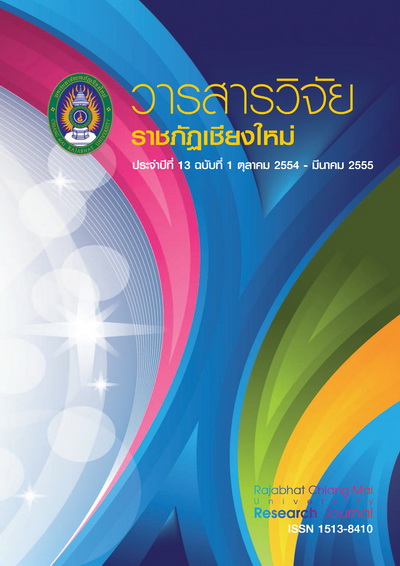การใช้กระบวนการจิตตปัญญาศึกษาในการพัฒนา การรู้คิดของนักศึกษาระดับปริญญาตรี
DOI:
https://doi.org/10.14456/rcmrj.2012.96108Abstract
จิตตปัญญาศึกษา เป็นการศึกษาที่มุ่งเน้นในทางสำรวจและพัฒนาภายในตนเองโดยการเรียนรู้อย่างใคร่ครวญผ่านกิจกรรมและประสบการณ์ตรง มีเป้าหมายก่อให้เกิดการเปลี่ยนแปลงขั้นพื้นฐานอันจะมีผลนำไปสู่พฤติกรรมการเรียนรู้ในด้านวิชาการที่ดีและเกิดสำนึกใหม่ที่ดียิ่งขึ้น วัตถุประสงค์การวิจัยในครั้งนี้ คือ เพื่อศึกษาพฤติกรรมการรู้คิดของนักศึกษาระดับปริญญาตรี มหาวิทยาลัยราชภัฏเชียงใหม่ ที่ใช้กระบวนการทางจิตตปัญญาเป็นกิจกรรมสอดแทรกในการเรียนการสอนปกติ และเพื่อศึกษาความพึงพอใจของนักศึกษาต่อการร่วมกิจกรรมตามกระบวนการทางจิตตปัญญาศึกษา กลุ่มตัวอย่างที่ศึกษา คือ นักศึกษาระดับปริญญาตรี สาขาวิชาชีววิทยา ชั้นปีที่ 4 จำนวน 21 คน ระยะเวลาการทำกิจกรรมทางจิตตปัญญาศึกษาแทรกอยู่ในการเรียนการสอนตามปกติในวิชา วิธีสอนชีววิทยา 1 และวิชาทดลองสอน 1 ติดต่อกัน 7 สัปดาห์ ผลการศึกษาพบว่า เมื่อนักศึกษาได้ทำกิจกรรมในสัปดาห์แรกแล้ว นักศึกษาส่วนใหญ่เกิดความรู้คิดเพียงแค่ประเด็นแรกคือ การตระหนักรู้สามารถรายงานความรู้สึกของตนเองขณะทำกิจกรรมและควบคุมตนเองได้ นักศึกษาเพียงส่วนน้อยมีความสามารถเรียนรู้จากกิจกรรมและ/หรือวิเคราะห์ผลของกิจกรรมสรุปมาเป็นแก่นความรู้ ซึ่งเป็นประเด็นที่ด้องใช้ความสามารถในการรู้คิดมากกว่าประเด็นแรก ในสัปดาห์ต่อมานักศึกษามีการพัฒนาความรู้คิดมากขึ้นทีละน้อยตามลำดับ จนถึงสัปดาห์ที่ 5 นักศึกษาจำนวนมากขึ้นที่เริ่มแสดงความรู้คิดเด่นชัดขึ้น ในสัปดาห์ที่ 6 และ 7 นักศึกษาประมาณครึ่งหนึ่งแสดงความรู้คิดที่จะนำวิธีการของกิจกรรมผลของกิจกรรมและ/หรือแก่นความรู้ไปประยุกต็ใช้เด่นชัด ส่วนการปรับเปลี่ยนทัศนคติและพฤติกรรมของตนเองเริ่มมีประปรายในสัปดาห์ที่ 4 และสัปดาห์ที่ 5 เป็นด้นไป มีความเด่นชัดขึ้นเป็นลำดับ จนถึงสัปดาห์ที่ 7 นักศึกษาเกือบทั้งหมดแสดงความสามารถในการรู้คิดทุกประเด็น ส่วนในด้านความพึงพอใจของนักศึกษาในการร่วมกิจกรรมที่สอดแทรกในการเรียนการสอนปกติ นักศึกษาเกือบทั้งหมดระบุว่าชอบกิจกรรมดังกล่าว จึงเป็นการบรรลุวัตถุประสงค์ การวิจัยทั้ง 2 ข้อ
Using Jittapunyasuksa’s Process in Meta Cognition Developing of Ungraduated Student
Jittapunyasuksa, contemplative education is a process that aims to survey and develop personal insight through introspective activities and direct experiences. The target of this approach is to achieve the transformative learning. The aim of this research is to study behaviours of undergraduate students for the development of the meta cognition, Chiang Mai Rajabhat University, through using contemplative education process inserting into a normal teaching and learning. Another research aim is to study students’ satisfaction towards learning activities of contemplative education. The population of this study were 21 fourth-year undergraduate students. These contemplative activities have been inserted into a normal teaching and learning time in the course of Teaching Practice in Biology 1 and Methods of Teaching in Biology 1 for 7 consecutive weeks. The study result concludes that after attending the first week activity, most students have gained and developed only one aspect of the meta cognition, the consciousness. Students enabled to reflect their own feeling during conducting activities and able to control themselves. However, only few students enabled to learn and analyse these learning activities, which they could conclude learning activities into knowledge. This aspect of meta cognition requires more ability compared to previous consciousness aspect. Few weeks later, students have gradually developed their meta cognition. เท the fifth week, many students have clearly shown their ability of meta recognition. เท the ธ"1 and 7th week, a half of students have shown their ability of meta recognition through introducing activities, resulting activities and/or knowledge which can be used to apply. For changing attitude and behaviour of students, it can be clearly shown in the 4th and 5th week, but it is gradually shown. Until the 7th week, most students have shown their ability for the meta cognition in all aspects. For students’ satisfaction of inserting activities of contemplative education in the course, most students indicated that they prefer practical activities. Thus, it can be concluded that two research aims were achieved.
Downloads
Downloads
How to Cite
Issue
Section
License
1. Articles, information, content, images, etc published in the “Community and Social Development Journal” are copyrighted by the Community and Social Development Journal, Chiang Mai Rajabhat University. In order to properly distribute the articles through print and electronic media, the authors still hold the copyright for the published articles under the Creative Commons Attribution (CC BY) license, which allows the re-distribution of the articles in other sources. References must be made to the articles in the journal. The authors are responsible for requesting permission to reproduce copyrighted content from other sources.
2. The content of the articles appearing in the journal is the direct responsibility of the article authors. The editorial board of the journal does not necessarily agree with or share any responsibility.














